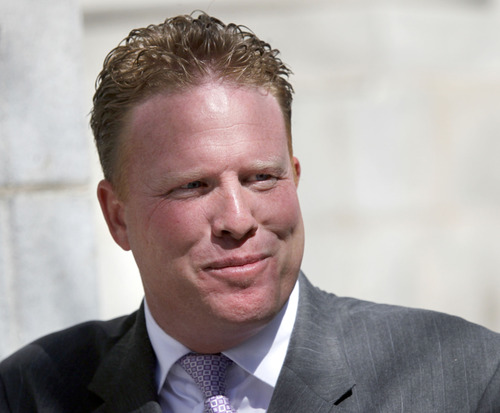This is an archived article that was published on sltrib.com in 2014, and information in the article may be outdated. It is provided only for personal research purposes and may not be reprinted.
Nearly four years after suing St. George businessman Jeremy Johnson for allegedly defrauding consumers, federal regulators have taken aim at companies and their officers accused of helping him process credit cards.
A California company and two from Idaho are accused of aiding Johnson to allegedly defraud consumers through creation of shell companies used to process credit cards. Johnson and four others from his now-defunct I Works company have pleaded not guilty in federal court in Salt Lake City to a slew of criminal charges over those same allegations.
Named in the new Federal Trade Commission lawsuit filed in Las Vegas are CardFlex of Costa Mesa, Calif., and officers Andrew M. Phillips and John S. Blaugrund; as well as Blaze Processing of Rigby, Idaho; and Mach 1 Merchanting of Idaho Falls, and officers Shane Fisher and Jeremy Livingston.
Those entities and officers were not named in the 86 criminal charges related to bank fraud that Johnson and the four others face in Utah.
But their appearance in the new civil suit inevitably bleeds into the criminal case in which Johnson is accused of trying to hide the fact that he owned the shell companies that were listed under the names of company employees and others. In the new case, the seven defendants are accused of relaxing underwriting standards for merchant accounts as long as Johnson personally guaranteed them, though it was unclear whether they told Wells Fargo — which hosted the merchant accounts — of Johnson's connection to the shell companies, or were required to do so.
The California and Idaho companies and the named officers are accused of helping I Works defraud tens of thousands of customers in setting up new merchant accounts after card companies and banks began shutting down current accounts because of large numbers of chargebacks from consumers.
The FTC contends that I Works didn't properly disclose automatic charges that showed up on consumer cards after they purchased a product from the company for a minimal charge.
Those products, such as information on how to get government grants for personal expenses, were largely bogus, the agency claimed when it sued I Works and Johnson in December 2010 in federal court in Las Vegas.
Johnson and most other defendants have denied the allegations and the case remains pending.
Johnson, now under a gag order in his criminal case, has said in the past that I Works was the victim of fraud from other online merchants with whom it contracted. He said I Works set up those new companies — a standard industry practice, he maintained — to help find out which of the contracted merchants were causing the fraud.
Fisher and his Blaze Processing and Mach 1 Merchanting have entered into an agreement with the FTC to settle the allegations filed Wednesday. He agreed to personally pay $328,467.
"As is stated in the proposed order filed with the court, my clients do not admit to having engaged in any unlawful conduct," said Jeremy Adamson of Kunzler Law Group, the Salt Lake City attorney for Fisher and his companies.
The two CardFlex officers named in the complaint did not return emails seeking comment on the allegations.
The FTC alleges CardFlex and the others actively helped create the shell companies and obtain merchant processing accounts and then benefited from the fees they earned as a result.
"Defendants caused these charges to consumers' credit card accounts by actively employing, and advising or enabling the fraudulent merchants to employ, numerous tactics that were designed to evade fraud monitoring programs implemented by Visa and MasterCard," the FTC complaint states.
The federal judge in Las Vegas who presides over the Johnson case, Miranda Du, also has brought the new case into her courtroom.
Johnson started a political and legal firestorm that eventually led to the resignation of Utah Attorney General John Swallow in December. Accusations against Swallow in part were related to his efforts to try to help Johnson stymie the FTC's 2010 investigation of I Works.



